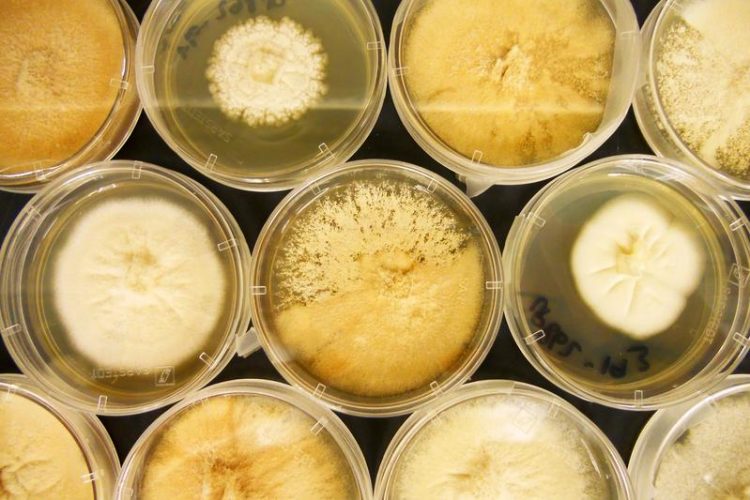Marine fungi contain promising anti-cancer compounds

Colonies of Scopulariopsis brevicaulis after roughly seven days of cultivation. Photo: Linda Paun
To date, the ocean is one of our planet's least researched habitats. Researchers suspect that the seas and oceans hold an enormous knowledge potential and are therefore searching for new substances to treat diseases here.
In the EU “Marine Fungi” project, international scientists have now systematically looked for such substances specifically in fungi from the sea, with help from Kiel University and the GEOMAR Helmholtz Centre for Ocean Research Kiel.
A particularly promising finding is the identification of the genes of one of these fungi, which are responsible for the formation of two anti-cancer compounds – so-called cyclic peptides. A research team headed by Professor Frank Kempken, Head of the Department of Genetics and Molecular Biology in Botany at Kiel University, has now published these new findings in the current edition of PLOS One.
They studied a strain of Scopulariopsis brevicaulis, isolated from a marine sponge found in the Mediterranean Sea. Previous research has shown that the fungus can form the cyclic peptides scopularides A and B, which can inhibit the growth of pancreatic and colon tumour cells. Cyclic peptides have been at the centre of the search for medical substances for a while now.
A whole series of these proteins, formed by bacteria and fungi, amongst other things, have already proven themselves in various aspects of human therapy. Certain antibiotics such as Penicillin also belong to this group, for example.
Until now, however, it was not known which genes in the fungus are responsible for forming anti-cancer compounds. Using genome analysis, the researchers in Kiel were now able to identify NRPS 1 and PKS 2 from the roughly 16,000 eligible genes from the fungus. This gene pair forms the scopularides A and B. This makes it possible to synthetically produce the peptides and alter them in terms of ideal effectiveness.
“Fungi are capable of producing a wide range of different substances, depending on the external conditions. Our challenge lies in recognising the right circumstances for forming a possible compound as well as the genes involved. We have managed to do this, in this case, by identifying the genetic origin of the potential anti-cancer peptides”, says Kempken on the importance of these research findings.
The researchers received the fungi cultures that they studied from the collection of the former Kiel Center for Marine Natural Products at GEOMAR (KiWiZ, now the GEOMAR-Biotech), which also deals with the search for marine agents. Professor Johannes F. Imhoff discovered the fungus during a microbiome analysis of the Tethya aurantium sponge. The sponge seemed to provide a setting in its middle that would enable the fungus to survive in the marine environment.
Kempken's research team then sequenced the genome from Scopulariopsis brevicaulis using three different methods. “When identifying the genes, it was helpful that fungi form so-called gene clusters. Genes that have the same function are close together in these organisms”, says Dr Abhishek Kumar, former post-doctoral researcher in the Department of Genetics and Molecular Biology in Botany at Kiel University and current scientist at the DKFZ German Cancer Research Center in Heidelberg. The compounds from the marine fungus were able to inhibit the growth of certain pancreatic and colon tumour cells in a cell culture. Further intensive research is necessary, however, in order to discover whether the substances are suitable for human therapies.
Original publication:
Abhishek Kumar, Bernard Henrissat, Mikko Arvas, Muhammad Fahad Syed, Nils Thieme, J. Philipp Benz, Jens Laurids Sørensen, Eric Record, Stefanie Pöggeler, Frank Kempken (2015): De Novo Assembly and Genome Analyses of the Marine-Derived Scopulariopsis brevicaulis Strain LF580 Unravels Life-Style Traits and Anticancerous Scopularide Biosynthetic Gene Cluster, PLOS Biology.
Link: http://dx.doi.org/10.1371/journal.pone.0140398
Contact:
Prof. Frank Kempken
Abteilung Genetische Botanik und Molekularbiologie
Botanisches Institut und Botanischer Garten, CAU Kiel
Tel.: +49 (0)431/-880-4274
E-mail: fkempken@bot.uni-kiel.de
More information:
Department of Genetics and Molecular Biology in Botany
Botanical Institute and Botanical Gardens, Kiel University
http://www.uni-kiel.de/Botanik/Kempken/fbkem.shtml
Research focus “Kiel Life Science”, Kiel University
http://www.kls.uni-kiel.de
EU Cooperation project “Marine Fungi”:
https://www.marinefungi.eu/de
Media Contact
All latest news from the category: Life Sciences and Chemistry
Articles and reports from the Life Sciences and chemistry area deal with applied and basic research into modern biology, chemistry and human medicine.
Valuable information can be found on a range of life sciences fields including bacteriology, biochemistry, bionics, bioinformatics, biophysics, biotechnology, genetics, geobotany, human biology, marine biology, microbiology, molecular biology, cellular biology, zoology, bioinorganic chemistry, microchemistry and environmental chemistry.
Newest articles

First-of-its-kind study uses remote sensing to monitor plastic debris in rivers and lakes
Remote sensing creates a cost-effective solution to monitoring plastic pollution. A first-of-its-kind study from researchers at the University of Minnesota Twin Cities shows how remote sensing can help monitor and…

Laser-based artificial neuron mimics nerve cell functions at lightning speed
With a processing speed a billion times faster than nature, chip-based laser neuron could help advance AI tasks such as pattern recognition and sequence prediction. Researchers have developed a laser-based…

Optimising the processing of plastic waste
Just one look in the yellow bin reveals a colourful jumble of different types of plastic. However, the purer and more uniform plastic waste is, the easier it is to…



